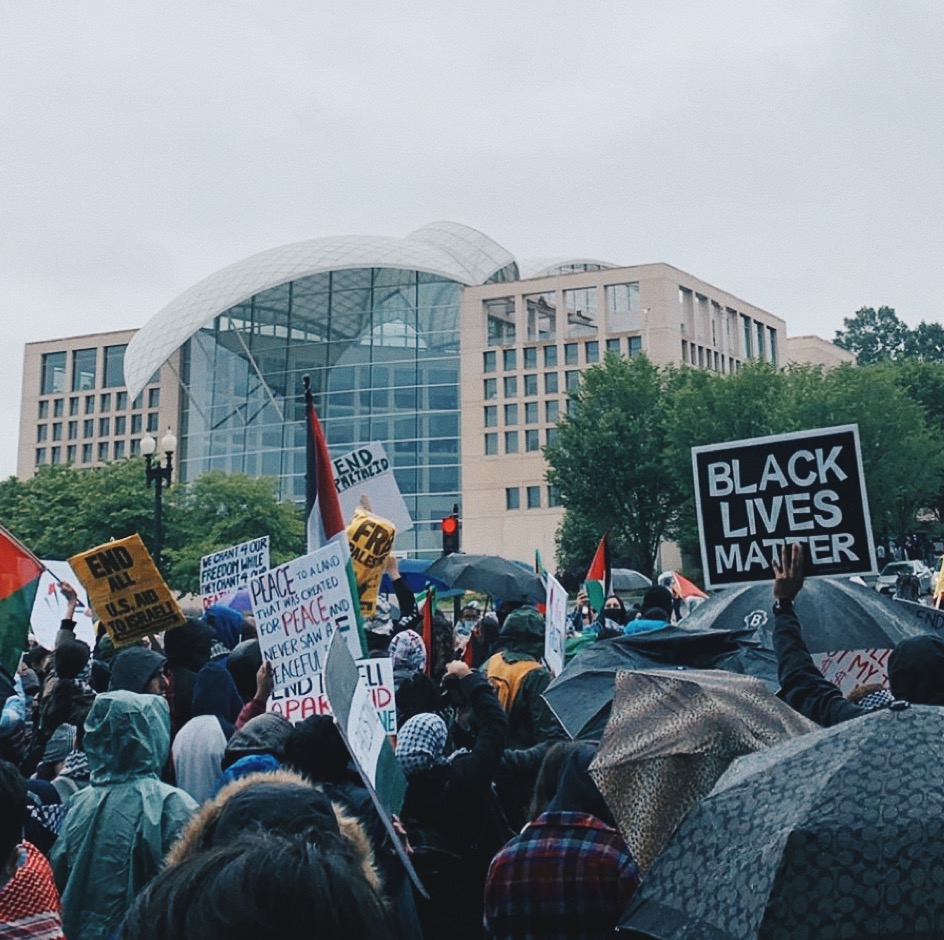The People, United
A sea of umbrellas, raincoats, and cardboard signs marched onward down Constitution Avenue despite the pouring rain. Gloomy skies enveloped Washington D.C. that cold May afternoon, but the atmosphere at the protest below felt electric.
Before heading back to my hometown to start my remote summer internship at the United States Institute of Peace (USIP), I made a pit stop in D.C. for the National March for Palestine. Hundreds of people from across the country assembled at the Lincoln Memorial to walk in solidarity, drawing attention to ongoing human rights abuses and occupation in Gaza and the West Bank.
Protestors shouted some of the same chants from the previous summer, when U.S. police brutality re-ignited nationwide Black Lives Matter rallies. At this protest, Free Palestine posters traversed the streets alongside Black Lives Matter signs, both movements intertwined in their struggle for justice, for freedom from oppression.

“The people, united, will never be defeated!”
“2-4-6-8, Stop the violence, stop the hate!”
“No justice, no peace!”
As the protestors turned the corner of Constitution and 23rd Street, I saw the USIP building for the first time, looming larger in the background with every step. Built to serve as a monument, an educational space, and a research center, the building’s glass facade is meant to symbolize transparency, harmony, and openness. The very ideals we were marching for had been incorporated into USIP’s structural design. But how can we use these ideals to build an equitable and peaceful global society?
The work assignments I received a week later grappled with this question, pulling together findings from discussions with Nigerian citizens in Borno, Adamawa, and Yobe about the security situation in the area. These states in northeast Nigeria have been considerably affected by insurgent groups like Boko Haram. This has led to millions of people becoming internally displaced (IDPs) and relocating to host communities in other areas of the country. Police and military accountability, therefore, has been a pressing concern when it comes to keeping these communities safe. However, corruption is rampant, and it minimizes civilians’ perception of safety, causing internal strife and mistrust of security officials.
With a narrative that echoes themes from both Palestine and the U.S., Nigerian society faces an uphill battle when it comes to regulating police forces and enhancing safety measures for IDPs who are living miles away from their homes. As I spend my time summarizing multiple civilian focus group discussions and workshop reports, I see the same themes come up, time and time again. Peace begins when we address the systems that oppress us, when we topple and reform structures that propagate harm. It is our hope to build the kind of tranquility that is embodied in the USIP building, but until then, we keep marching. I look forward to continuing this work over the summer.